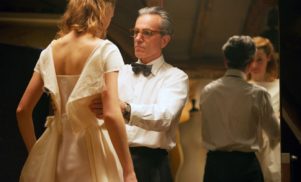Jonny Greenwood fashioned romance, intrigue and flashes of horror from a 60-piece orchestra on his score to Paul Thomas Anderson’s Phantom Thread, nominated for Best Score at this Sunday’s Oscars. Could history one day remember the 46-year-old more for his soundtrack work than his guitar histrionics in Radiohead? Al Horner tries to find the answer in a haunting OST that balances tension, trauma and tenderness.
Last month, Jonny Greenwood turned up to a London screening of Phantom Thread – Paul Thomas Anderson’s film about a controlling dressmaker who obsesses over every button and every stitch of the lavish garments he creates – in trainers, baggy jeans and a crinkled blazer. “I hope he comes to the Oscars,” the more sharply-attired Anderson joked with the crowd, unable to resist a friendly poke at his friend and four-time collaborator. “If only because then, he’ll have to wear a tux.” The room laughed, before Anderson went one step further in sharing his Academy Awards dream. “Actually, I hope he wins,” he said, gesturing over at the notoriously shy composer. “Then he’ll have to give a speech.”
Greenwood deserves to win Best Score at this Sunday’s ceremony. Partly to right the wrongs of Oscars past: this is somehow only the Radiohead man’s first nomination, despite incredible contributions to There Will Be Blood, The Master and Inherent Vice as well as the odd non-Anderson film, like Lynne Ramsey’s We Need To Talk About Kevin. But mainly, Greenwood deserves the Oscar because his Phantom Thread score is a fever dream of rich orchestral flourishes, piano and Hermann-esque tension that’s so deep-woven into the fabric of Anderson’s film, it’s impossible to imagine it without. From the pizzicato creep of ‘The Hem’ to the heartbreaking piano float of ‘Alma’, it’s a tapestry of sounds as exquisite as one of Reynolds Woodcock’s dresses, and as grand as the man’s breakfast order.
The music of Phantom Thread is hard to pin down because so too is Phantom Thread. Woodcock (Daniel Day-Lewis, in his supposedly final performance) is a high society London dressmaker who finds a new muse (and romantic partner) in the quaint Alma (Vicky Krieps). As their relationship develops, the film initially threatens to be a romance (all charming walks across windswept hills and silent, smitten glances across cosy fireplaces) then a drama, about an intense, gifted character and the couture world he commands. Before too long it transforms into a semi-horror film about the claustrophobic torture of living with the mythical “male artist genius” (eurgh) with shades of Hitchcockian revenge as Alma schemes to take back control. It ultimately refuses to be any of the above, weaving its way to a conclusion that questions the nature of relationships, the trauma of dependence and rewards of devoting yourself to someone. (There are some fucking cool dresses in it, too.)
Its score follows suit, never quite resolving its melodies as you expect. Greenwood’s four main themes mirror the generic twists the film embarks on, taking the same flutter of notes tumbling through doomy timpani smashes on ‘Phantom Thread III’ having imagined them elsewhere as a whistle-high string serenade (‘Phantom Thread I’) and solo piano lament (‘Phantom Thread II’). It’s all recorded with minimal reverb, which brings a claustrophobia that makes the confines of Woodcock’s home, where most of the film unfolds, feel all the narrower. In the score’s more forboding moments, like ‘Barbara Rose’, on which you can hear every violent string scrape, this effect is suffocating and almost maddening. Elsewhere, it lends beautiful intimacy: the gorgeous ‘House of Woodcock’ (maybe my favorite Greenwood-penned piece of music ever, Radiohead included) has the up-close emotion of a ballroom dance, this caress of a composition that’s as authentically romantic as any of the 1950s music that inspired it (“I’m a big fan of all of these really over-the-top baroque recordings from that era,” he told NPR).
After four films together, Greenwood and Anderson share a creative trust that runs deeper than ever. The composer’s only instruction from Anderson was “‘big-ass strings,’ which I think is American for ‘orchestra,’” Greenwood told Esquire. A mammoth 90 minutes of his score made the final cut. “When I told [this to] Robert Ziegler, who conducted [a portion of] the score, he said, ‘That’s not a soundtrack, that’s a musical!’” the Radiohead guitarist remarked to Variety. Maybe it should be no surprise he had mightier imprint on Phantom Thread than any of their previous collaborations, as the film wouldn’t exist without him: at the London screening I was at, Anderson recalled how Greenwood likened him to Beau Brummell in 2015 – a regency dandy whose obsessiveness when it came to clothes was the spark for the character of Woodcock.
Phantom Thread has a sartorial precedent. Remember a few years ago how a dress – either white and gold or blue and black, depending on who you asked – dress took over the internet, dividing timelines? Critics and cinemagoers have similarly seen different hues in Anderson’s film, interpreted as a “battle of the sexes comedy” by Sight & Sound, a “cracked romance” with a “fairytale underpinning” by The Guardian and a “social horror” that tips into “erotic study” by New Statesman. That ambiguity would be impossible without Greenwood, whose majestic, shape-shifting score is key to its elusiveness. There’s plenty of solid contenders for this year’s Best Score Oscar, but whichever way you dress it up, Phantom Thread would be the worthiest winner. Better start ironing that tux, Jonny.
Al Horner is editor-in-chief of FACT. Find him on Twitter.
Read next: If Sufjan Stevens doesn’t win an Oscar for Call Me By Your Name, I will fucking riot





























